CAW member and conference co-organiser, Vedrana Velickovic, reports on the success of the CAW-funded conference Common Threads
The Common Threads conference was held at the University of Brighton from 21-23 July 2023 at Edward Street, City Campus. It was co-organized by Prof Suzanne Scafe (Brighton), Dr Kadija George (recent Brighton PhD Graduate), Dr Sarah Lawson Welsh (York), Amanda Holiday (PGR Brighton) and Dr Vedrana Velickovic (Brighton). The first conference entitled ‘Black British Women’s Writing: Tracing the Tradition and New Directions’ took place at Falmer campus in 2014 and it was also the inaugural conference the Black British Women’s Writing Network (BBWWN). The follow-up and aim of Common Threads in 2022 was to celebrate the fact that so many Black and Asian women writers have emerged in the last two decades and to assess the significant impact their writing has made on publishing, the curriculum and the media since 2015. The last couple of years have been particularly exciting for Black and Asian British women writers with Bernardine Evaristo winning the Booker Prize in 2019, the first Black British woman to do so, and several debut authors such as Reni Eddo-Lodge topping the UK’s fiction and nonfiction paperback charts in 2020-21, and receiving substantial attention and recognition. The recent publication of The Cambridge Companion to Black British and Asian Literature 1945 – 2010 (edited by Deirdre Osborne), and The Cambridge History of Black and Asian British Writing (edited by Susheila Nasta and Mark Stein) bring together over 400 years of Black and Asian British writing. 2022 also marks the 21st anniversary of the landmark ‘Write Black, Write British’ conference at the Barbican (organised by Kadija George), and of the publication of the anthology Bittersweet: Contemporary Black Women’s Poetry. Common Threads was building on this rich cultural heritage and explored how Black and Asian British Women’s Writing has enabled us to re-imagine the nation otherwise in the context of the unsettling, hostile environment of post-Brexit Britain. Over 3 days we had 80+ people attending, 3 keynote speakers – Sharon Duggal, Bernardine Evaristo, Dr Louisa Uchum-Egbunike – and 65 presenters which included writers, academics and PhD students from the UK, Belgium, Germany, Spain, Canada and the US.

The morning of Day 1
Day 1 started with a welcome from the Vice Chancellor and the first keynote speech from our local writer Sharon Duggal. Sharon read from her recent novel Should We Fall Behind (2020) and we talked about her work, recent developments in British Asian writing and the importance of telling stories of people that are often ignored. She also talked about systemic discrimination that creates the environment for the imposter syndrome to emerge. As Ellis Walker, one of the PhD students who attended the conference, paraphrases Sharon ‘imposter syndrome is not just something that comes from within, but from worrying that our stories won’t be considered as important, from our stories being considered to be invisible (see their conference blog). It was important to address these issues from the outset in the predominantly white spaces of the university, academic conferences, the publishing industry, the classroom and similar conversations about representation and gatekeeping continued over lunch and coffee breaks over the next two days.

Sharon Duggal Keynote 1
The first evening continued with two writers’ panel that were sponsored by our partner New Writing South. One of our aim with the conference from its conception was to bring writers and academics together and begin to rethink the dominant and Eurocentric format of academic conferences. We were so excited to have Samantha Williams from This is Book Love, a travelling multicultural book carnival specialising in inclusive, bi-lingual, diverse, anti-racist books for children and adults, as our conference bookseller. Her carefully curated bookstall completely transformed the sanitised space of the Edward Street foyer and created the main social hub of the conference. Participants were able to buy books signed by authors who were at the conference and chat and mingle around this space. They also went to our local bookstore Afrori Books, Brighton first and only bookshop specialising in books by Black authors.
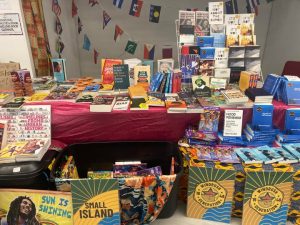
This is Book Love Stall at Common Threads
Next to the bookstall, our recent graduates Nisha Whittingham and Mya Ramsey were offered a space at the conference to display their poems and beautiful artwork. It was important to support and celebrate the work of our undergraduate Black students who are often minoritised in the classroom, the curriculum and the University spaces and create networking opportunities for the future.
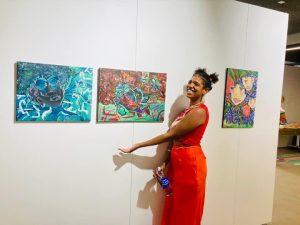
Nisha Whittingham and her artwork
We were also showcasing some of the local creative achievements and were joined by Monica from the Aghh! Zine, created in the heart of Brighton and focusing on subjects that are considered taboo or not mainstream, and Amy Solis from Writing our Legacy bringing us the latest issue of the Covert Journal that showcases global majority/BPOC creatives based in or with a connection to the South East England, and the Hidden Sussex Anthology.

Monica from the Aghh! Zine
The Speculative Fiction Panel chaired by Leone Ross was such an electric and inspiring round-table discussion about what happens creatively and socially when black women writers write speculatively. The writers-panelists Judith Bryan, Katy Massey and Gemma Weekes offered short readings from their contributions to the first speculative fiction anthology of Black British writers entitled Glimpse: Black British Speculative Fiction, edited by Ross and to be published by Peepal Tree Press in September 2022. We look forward to their book launch at Afrori Books in January 2023!

Leone Ross, Katy Massey, Judith Byan, Gemma Weekes and Kadija George
This was followed by the Poetry Panel chaired by Isabelle Baafi (Reviews Editor at Poetry London) that reflected on how the development of Black British Poetry since 2020 has largely occurred in groups founded by women. Sundra Lawrence (Malika’s Kitchen), Rheima Robinson (Leeds Young Authors) and Dorothea Smartt (Inscribe) discussed their craft, literary activism and their impact on the UK poetry landscape with readings from their work.
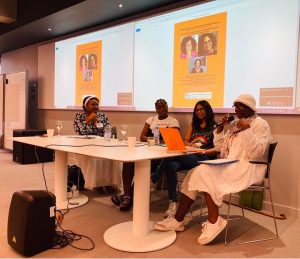
Isabelle Baafi, Rheima Robinson, Sundra Lawrence and Dorothea Smartt
Over the next two days we had a packed programme with papers on BLack Writing and Trauma, Black British Women’s and Non-binary Writing for Solo Performance, Experimental Narratives, Identity and (Un)belonging, The Politics Of Publishing And Literary Prizes, Archives, Histories, Memories, to name a few.

Samantha Williams, Patricia Cumper, Pauline Walker
Day 2 started with a short presentation from our esteemed guest Patricia Cumper MBE and Pauline Walker from THE AMPLIFY PROJECT, a podcast that celebrates Black writers for the stage, page and screen, what inspires them and why they write. They created a recording studio in the ‘the Fish Bowl’ room at Edward Street and spent the next two days talking to writers, organisers and participants. We are so grateful that they have produced a special podcast about the conference and have left a lasting legacy about it, listen to the episode.

Lynette Goddard, Amy Terry and Deirdre Osborne
Lynette Goddard, Amy Terry and Deirdre Osborne at their Black British Women’s and Non-binary Writing for Solo Performance panel, the only one that looked at theatre and we certainly need more academic research on Black and Asian British Theatre as well as poetry and its representation at conferences and in academic publications
Day 2 culminated with a panel on ‘Writing New Landscapes and Walking the Global Imaginary’ and some fascinating readings by local writers Alinah Azadeh (project lead), Dulani Kulasinghe, Akila Richards, Pauline Rutter, Anooshka Rawden, Cultural Heritage Lead at the South Downs National Park Authority (SDNPA) and Amy Zamarripa Solis (Writing Our Legacy). This panel was funded by The Centre for Arts and Wellbeing, University of Brighton, and discussed their project We See You Now (WSYN), a landscape & literature project dedicated to creating greater cultural equity in the representation of narratives within the iconic coastal area of the Seven Sisters & Sussex Heritage Coast and evoking the trans-global imaginary of the Seven Sisters & Sussex Heritage Coast through new stories and poetry.
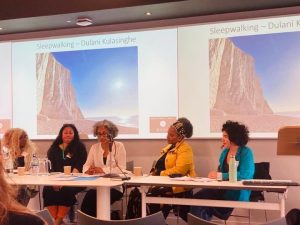
Pauline Rutter, Amy Solis, Dulani Kulasinghe, Akila Richards, Alinah Azadeh
We then all moved to the Sallis Benney Theatre for Bernardine Evaristo’s keynote speech, introduced by Prof Stephen Maddison (Dean, School of Humanities and Social Science) and chaired by Dr Velickovic. Bernardine has been a great supporter of our work over the years and she was also our keynote speaker at the 2014 conference. It was so wonderful to celebrate her work, her recent successes and her tireless literary activism. She gave another intellectually and politically stimulating and beautifully delivered speech where she took the time and care to name and celebrate so many Black and Asian British writers who have significantly transformed Britain’s cultural landscape in the last couple of years. Just hearing so many names and the breadth and the diversity of works being produced have been really empowering and she has given us a lot of reasons to be optimistic about the future and the changes that are finally happening, even though we have a long way to go. We continued some of these conversations over conference dinner.
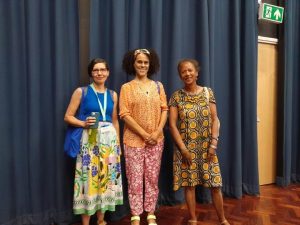
Vedrana Velickovic, Bernardine Evaristo, Suzanne Scafe ‘rocking bold prints’ as Evaristo commented
Day 3 started with a panel ‘Celebrating Bernardine Evaristo’, followed by papers on Twenty-First-Century Black Welsh Women Writers, Contemporary Short Stories by Black British Women, Black chick-lit, Regional Black British Women, Memoir and Life Writing. The highlights of the day for me were the following two panels – the ‘Uncovering And Developing Marginalised Voices’ and ‘Cultural Activism/Writers As Activists’ panel. In the first panel Panya Banjoko, founder of the Nottingham Black Archive in 2009, spoke powerfully about their important work on recovering hidden Black women writers’ voices from Nottingham up to 1970s and their influence on the next generation of writers, as well as the problematic issue of white researchers mining the Black archive. Writer’s Carol Leeming (MBE) paper and  performance was a timely ‘call to arms at the erasure and marginalisation of East Midlands Black women poets and writers’ and it was important to hear devolved regional Black Women’s voices that are silenced in discussions of Black and Asian Women’s Writing tending to be predominantly focused on the metropolitan areas. Farhana Shaikh usefully reminded us of Arundhati Roy’s quote that ‘There is really no such thing as the “voiceless”. There are only the deliberately silenced, or the preferably unheard,’ and spoke about her journey as a publisher and and many important projects and initiatives that she has set up to help develop early-career South Asian women writers in the region.
performance was a timely ‘call to arms at the erasure and marginalisation of East Midlands Black women poets and writers’ and it was important to hear devolved regional Black Women’s voices that are silenced in discussions of Black and Asian Women’s Writing tending to be predominantly focused on the metropolitan areas. Farhana Shaikh usefully reminded us of Arundhati Roy’s quote that ‘There is really no such thing as the “voiceless”. There are only the deliberately silenced, or the preferably unheard,’ and spoke about her journey as a publisher and and many important projects and initiatives that she has set up to help develop early-career South Asian women writers in the region.

Kadija George, Carol Leeming, Farhana Shaikh, Panya Banjoko
The ‘Cultural Activism/Writers as Activists’ panel, chaired by Suzanne Scafe Jess Bond and sponsored by The Centre for Spatial, Environmental and Cultural Politics (SECP), gave us a powerful and important intergenerational conversation with Kemi Alemoru from gal-dem, an online and print magazine committed to telling the stories of people of colour from marginalised genders, Nkenna Akunna from Skin Deep, a predominantly Black and POC-led magazine that makes space for Black creatives and creatives of colour to work towards justice through cultural production and Pawlet Brookes, the founder, CEO and artistic director of Serendipity – Institute for Black Arts and Heritage in Leicester whose mission is to centre perspectives from the African and African Caribbean Diaspora, embedded as part of cultural experiences for all. As they were showcasing some of their recent projects that celebrate diversity, local communities and diasporic and intersectional and identities, I was thinking how I wanted to see more of such panels at future conferences where women of colour in all their brilliance are at the centre stage as panelists and chairs. Indeed, panels like this gave us a lot to think about future conference planning and doing things differently as I am also aware that there were some panels that were predominantly white which opens up further questions about who is producing academic work on Black and Asian British Writing, which writers tend to feature in those discussions, the whiteness of the academia and the urgent need of decolonising these spaces and ensuring that academics of colour are shortlisted for interviews and employed. The statistics are still dire in 2022. If we get a chance to organise conference number 3, we will certainly reflect on what we’ve learned this year and it would be nice to decolonise academic conferences further, for example by having a day by the sea to rest and network in a different way with each other.

The conference ended with Rahila Gupta, an anti-racist and feminist campaigner and longstanding member of the pioneering collective Southall Black Sisters, discussing her monodrama, Don’t Wake Me: The Ballad of Nihal Armstrong, and her work dedicated to social justice, with our colleague Deirdre Osborne, a Reader in English Literature and Drama and co-founder of the first and only MA Black British Literature at Goldsmiths. Dr Louisa Uchum Egbunike from Durham delivered the third keynote speech on Buchi Emecheta and the importance of her work in the canon of Black British Writing, followed by a launch of the Special Double Issue or Ariel ‘Andrea Levy in Memoriam’ with some of the editors and contributors. As Kadija George noted, it was interesting that the conference ended with the writers who are no longer with us and in the spirit of remembering and honouring their contribution and creative legacy.

Deirdre Osborne and Rahila Gupta
We were so touched to receive beautiful thank you cards thoughtfully sourced from This is Book Love and collected from the participants by our friend and colleague Deirdre Osborne. We thank you all and we hope that the connections and friendships that we have created at the conference will grow and sustain us in the future. We have received incredible and important feedback from writers and academics and we are forever grateful to Pauline and Patricia for capturing some of them in the podcast:

Kadija George and Louisa Uchum Egbunike
‘very affirming and uplifting to be here with so many women of colour’
‘pleased and proud that there was an international conference on Black and Asian Women’s Writing and that was a wonderful idea’ (Razia Aziz)
‘Broadening the debate and having the conversations about a vast range of work that is being done by Black women and non-binary people of colour… and eventually there will be structural change’ (Prof. Lynette Goddard)

Deirdre Osborne, Kadija George, Sarah Lawson Welsh, Suzanne Scafe, Vedrana Velickovic
‘Action research and changing the canon…Black leadership in the institutions…we are part of British history and we will not be othered’ (Leeming)
‘More needed to be done…being the voice of authority to rupture and dismantle the existing system as best as I can’ (Panya Banjoko)
‘When you are submitting your work to publisher how do they know you are disabled…more than triple oppression’ (Eurekah Shabazz)
‘Writers who are struggling and are not recognized despite writing for a long time’ (Laura Fish)
‘Waves and surges [when we talk about Black British writing] rather than consistent presence…more than just a few people’ (Prof. Lynette Goddard)
‘What could be done differently, different modes of working and doing things that are African-centric rather than Eurocentric’ (Kadija George)
A really useful food for thought for the next conference.

We are so grateful to the School of Humanities and Social Sciences EDIP funding, CAW, SECP and NWS for their financial support. We would like to thank Josie and Esther from South Coast Conferences for their attention to detail, for being there to anticipate every problem before it became a problem and lowering my stress levels. A huge thanks also to the writer JC Niala for sponsoring three students to attend the conference – Najma Yusufi, Ellis Walker and Manon Martini – and to Alessandra Dusse, our student helper who worked tirelessly throughout the weekend to support the organising team, the participants and the bookseller. A heartfelt thanks to all our writers and delegates who came to read, speak, debate, challenge, listen and support the conference. We hope that the University will also decolonise its practices by allowing us to keep the income we generated from the conference and enable us to continue this work. I would personally like to thank my co-organisers, dear colleagues and friends Suzanne Scafe, Kadija George and Sarah Lawson Welsh – it was such a pleasure and privilege for us to be working as a team, together, online and in real life, and none of this could have happened without your tireless work, ideas, energy, care, expert chairing and curating at all stages. Until next time!
– Vedrana Velickovic
References/Quotes from the Delegates:


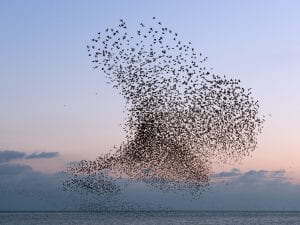


Leave a Reply